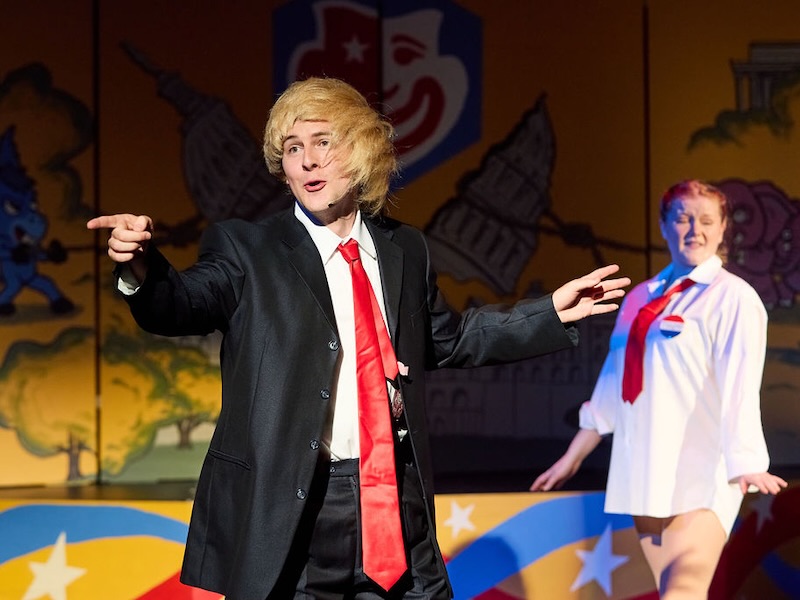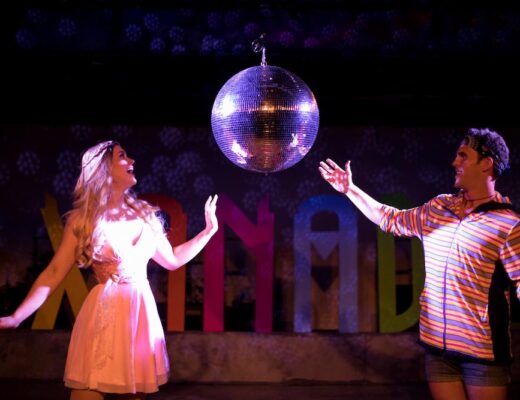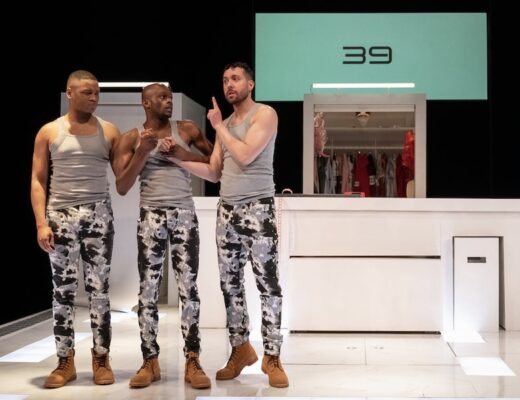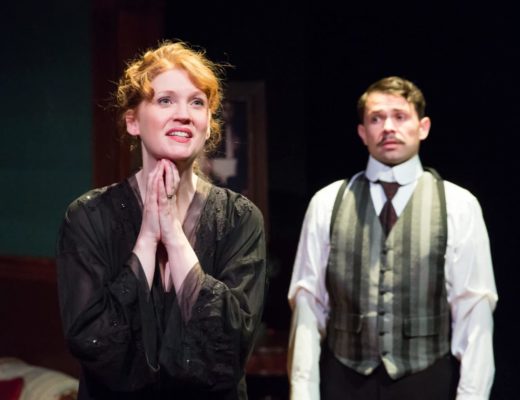By Eileen Miller
This article was originally published in DC Theater Arts here.
There is perhaps no harder time to write political satire sketches than the current moment; there’s simply too much material to work with. How do you decide what to satirize? Hexagon, in its new show Splitting Our Sides!, has decided, through sketch, song, and dance, to dabble in nearly everything.
The volunteer-run performing arts group with a 70-year history of being “Washington’s Only Original Political Satire Musical Comedy Revue” returns to the DC stage this spring after a two-year break. Although the production, a series of sketches and musical numbers satirizing national politics, began development months earlier, it also managed to incorporate multiple digs at recent events, including Pete Hegseth’s Signal group chat scandal and the Vances’ trip to Greenland.
While balancing the absurd, the political, and even the apolitical, Splitting Our Sides! steers clear of the most frightening developments in our political landscape. Instead, the show emphasizes humor in the hopes that laughter is still a potent enough cure for our politics-driven anxieties.
Within the show are some of the staples to be expected in any DC political sketch show. In one musical number, a President Trump played by Edward Hammarlund and backed by a trio of singing dancers in white dress shirts, long red ties, and stockings, triumphantly sings about how he will be “Comin’ After” all of those who wronged him. Hammarlund’s President’s glee is laced with malice, and the jazzy number he croons offers a performance entertaining enough to make you forget for a bit the chilling threats of his agenda.
At other times, the current resident of the White House is alluded to but not mentioned outright.
In one sketch, Gerald Ford (Neil Conway) descends from Heaven to Limbo to chat with Richard Nixon (Neil McElroy) about the GOP’s new affinity for felons. The sketch’s simple yet effective set — consisting of just a direction signpost indicating the locations of Heaven, Hell, and Limbo — allows the focus to be on the two former presidents and their humor-laced ruminations over their nation’s current state.
Other acts find humor in the apolitical. One musical number — based on Oklahoma!’s “The Farmer and the Cowman” — pokes fun at another polarizing rivalry dividing DC: bicyclists vs. drivers. Backed by a lively orchestra and performed with dynamic choreography evoking the chaos of the DC commute, the musical number is an entertaining respite from politics that reminds the audience there is more to complain about in this city than politics. Another musical act, “I sold my soul to ChatGPT,” is a well-sung reminder that these are times not just of turbulent political change but of technological change as well.
Perhaps cognizant of the need to address the greater threats looming over the country, the final performance of the first act is a full-cast musical number about the importance of freedom. This song, built on a rhythmic drumbeat and led by the rich vocals of Hazara Kawah, Lilly Andemicael, and Victoria Williams, adopts a more serious tone to remind the audience of the real threats our democracy faces. Through both its full-cast participation and Kawah’s encouragement of the audience to clap to the beat with her, the performance emphasizes solidarity in the face of unnamed threats that are doubtless clear in the audience’s mind. While showcasing the cast’s vocal prowess, its message felt like an anomaly in a show that was mostly humor and less call to action.
After the intermission, the show returns to its blend of sketches and musical numbers. The humor draws laughter, and the musical numbers are especially impressive, but despite the potential of political satire, the show’s content largely sidesteps the most troubling problems that face our country.
A DC institution, Hexagon has returned to the District at a time when there is much — perhaps too much — to ridicule in our national politics. Many of the acts are well-performed and genuinely entertaining, and yet the show itself seems to belong to a different era. This dissonance is not entirely unpleasant: the musical acts emulate the powerful orchestras and grand dance numbers of the Golden Age of Broadway, a testament to the creative talent of Hexagon’s volunteer creatives.
Their brand of satire, however, harks back to a time when you could laugh about current events, maybe feel a twinge of embarrassment, but ultimately go about your day without dreading what the next day’s news cycle may bring. As our news feeds are overwhelmed by stories of ignored court orders, annexation threats against our allies, and other actions that signal a trend away from democratic practices, is it still possible to simply laugh, clap, and then go on with our lives?
Still, Hexagon’s continued presence after 70 years is a reminder of the persistence and importance of volunteer-run local theater. Splitting Our Sides! may not level thoroughly biting challenges at power, but it will still make you laugh, and maybe that is sufficient; with free expression increasingly under threat, the ability to laugh at our leaders is a power in and of itself.





No Comments